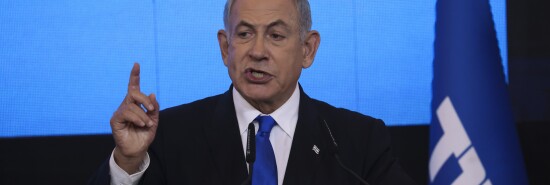
Netanyahu has trapped himself between Palestinian terrorists and fanatics in his own government
Tom Rogan
Video Embed
Israeli Prime Minister Benjamin Netanyahu is in trouble. On one side, Netanyahu faces a rising Palestinian terrorist threat from the West Bank. On the other side, the prime minister is struggling to restrain emboldened far-right members of his coalition government.
These two challenges have intersected in recent days with the murder of three Israelis by Palestinian terrorists in and around the West Bank. These attacks follow a recent escalation of violence by Palestinian Islamic Jihad-affiliated terrorists who have taken 11 Israeli lives. Making matters worse, extremist Israeli settlers seeking to avenge the deaths descended on the Palestinian town of Huwara and engaged in a melee of violent disorder on Sunday. The images of burning cars and homes have shocked Israelis, evoking memories of pogroms such as the Nazi Kristallnacht against German Jews. The Israel Defense Forces responded to the riots only belatedly, and none of those arrested remain incarcerated. This weak response fits with a broader Israeli failure to address settler violence against Palestinian civilians.
Netanyahu has called for law enforcement and the military to be left to do their jobs. He wants calm. The prime minister’s problem is that key members of his coalition government are openly undercutting him.
NEW YORK BUSINESS GALA ROLLS OUT RED CARPET FOR COMMUNIST CHINA
A few examples include:
Finance minister and Religious Zionist Party leader Bezalel Smotrich’s endorsement of calls to raze Huwara. Otzma Yehudit parliamentarian and Knesset national security chairman Zvika Fogel’s demand for “a closed, burnt Huwara — that’s what I want to see. … We need burning villages.” Otzma Yehudit parliamentarian Limor Son Har-Melech’s description of the Huwara rioters as “brothers” deserving of respect. While Otzma Yehudit leader and security minister Itamar Ben-Gvir has echoed Netanyahu’s calls to let the security forces handle the situation, he led a boycott of a Knesset debate on the crisis on Monday. The implied message: “Be careful about being too moderate, Bibi.”
Netanyahu is thus stuck. He needs both of these parties in his coalition if he is to retain a working Knesset majority. His coalition partners realize as much and are happy to pressure the prime minister to do or at least tolerate their bidding. But the crisis environment is only deepening. At the apex is Iran’s increasing enrichment of uranium to higher purity levels approaching weapons-grade also beckons.
What does Netanyahu do now?
Polls suggest that Netanyahu would lose power were another election held today, a reflection of growing public unease with his government. Of particular controversy are judicial reforms that would limit judicial review and move Israel toward absolute parliamentary sovereignty, a la the United Kingdom. These reforms would allow a simple majority on a small judicial appointment panel to appoint Supreme Court judges. Reduced age limits on judicial service would also provide immediate court-stacking opportunities for the government. Israelis are escalating their protests against the reforms.
Put simply, Netanyahu is under very significant pressure, with little prospect for calm.
